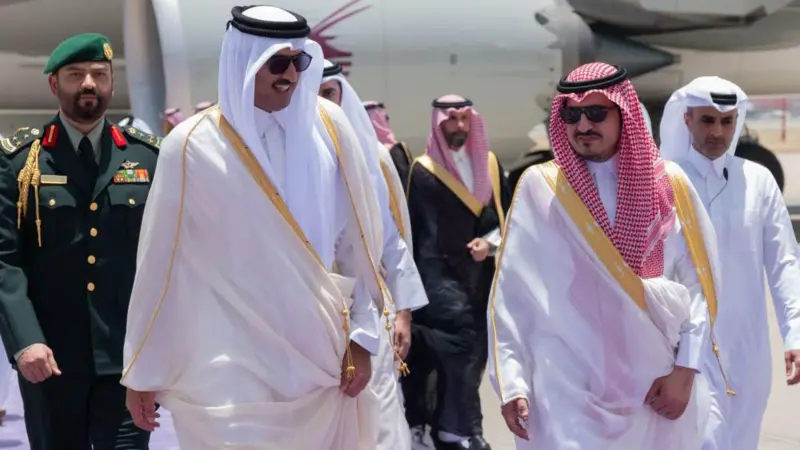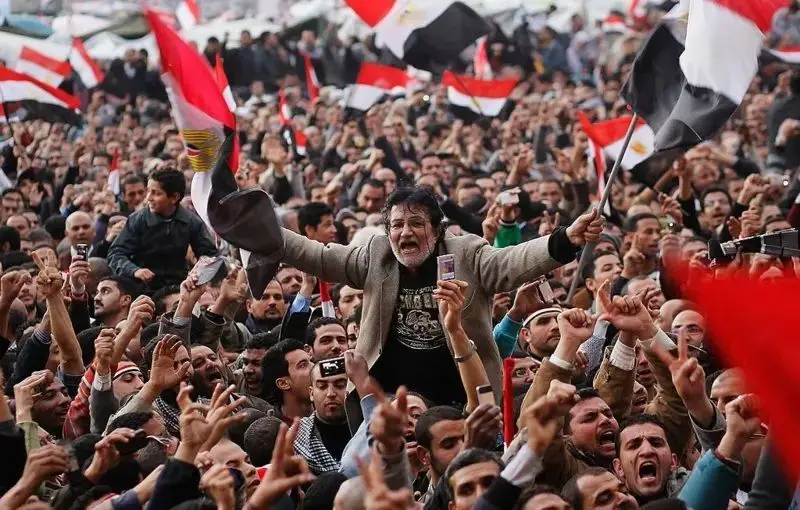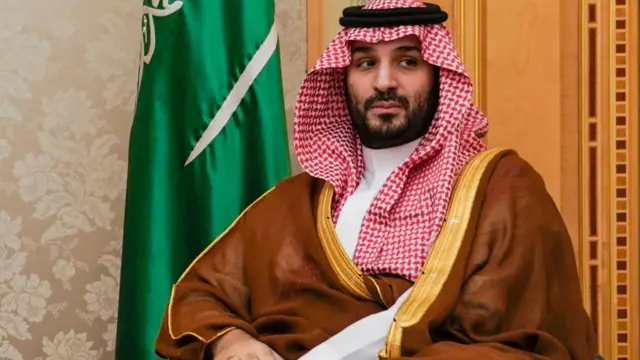“Where are the Arabs? Where are the Arabs?”
This is the question that every person in Gaza who has survived from the rubble of buildings destroyed by Israeli bombing is asking.
The residents of Gaza are repeatedly asking this question and are surprised that why their Arab neighbors are not protecting them from Israeli bombing.

After Hamas attacked Israel on October 7 last year, everyone’s eyes were fixed on the Middle East and the question in everyone’s heart was how sharp and long the response from Israel would be. This question was also how the people and governments of the Arab countries of the region would respond to this.
The Israeli bombing brought devastation in Gaza and according to the Health Ministry of the Palestinian Administration, 42 thousand 500 Palestinians have been killed so far. Even now the series of deaths does not seem to stop.
Part of the answer to the second question is clear. Anyone expecting large-scale demonstrations in the capitals of the Arab world will be disappointed.
Although large numbers of Arab countries support and stand in solidarity with the Palestinians, demonstrations in those countries have been limited.
Waleed Qadia, a professor at the Department of Political Science at the American University in Cairo, tells BBC Mundo: “As far as Arab governments are concerned, their response has been either very weak or disappointing.” He says: “Apart from the traditional criticism of Israel or the offer by the governments of Qatar and Egypt to mediate in the dispute, no one has supported the Palestinians.”
Waleed says no Arab country has broken ties with Israel or taken any action that would increase diplomatic or economic pressure on Israel or help prevent the war.
But why has the Palestinian problem lost its importance in the region? The answer to this question is complicated, given the situation in the Middle East.
Distance between public opinion and government

Throughout Arab history, Arabs have identified themselves with a single identity, a single language and, to a large extent, a single religion, but there have also been apprehensions arising from European colonial influence in the region. These countries’ interests have also clashed with each other.
Relations between Palestinians and Arab countries have also not been smooth, especially with those that welcomed large numbers of refugees after the declaration of the State of Israel in 1948.
The Lebanese civil war, and clashes between Palestinian extremists and the Jordanian monarchy are frequent reminders of the region’s tangled history.
But the Palestine problem has also been a reason for Arab countries to unite for many decades.
Timur Qarmut, associate professor of public policy at the Doha Institute for Graduate Studies, told the BBC: “During this time, the Israeli state was seen as an extension of the former colonial powers that had left the Middle East but left Israel as an agent to protect their interests, including Britain, France and now the US.”
Analysts say that countries such as Egypt, Syria, and Jordan have fought wars against Israel in the past to protect national interests as well as Palestinians.
But those wars are now a thing of the past. Egypt and Jordan signed peace agreements with Israel decades ago. Morocco, the United Arab Emirates, and Bahrain established diplomatic relations with Israel, whereas relations with Israel were disliked in the region until a few years ago.
Saudi Arabia was also close to establishing relations with Israel before the war between Hamas and Israel began on October 7.
According to Dov Waxman, director of the Center for Israel Studies at the University of California, “For many decades and since the beginning of the conflict, every Arab country has protected its interests. They talk about support and solidarity with the Palestinians, and it is not that these sentiments are not true, but they look at their national interests.”
Ilham Fakhroo, a researcher at the Middle East and North Africa Program at Chatham House, says, “The general public opinion in the Arab world is strongly against Israel.”
He says, “The people of Arab countries have a lot of sympathy in their hearts for the devastated people of Gaza and they want their governments to do more for the Palestinians. They want their countries to end diplomatic relations with Israel and at least react by expelling diplomats from their country.”
But this has not happened yet.
According to Imad Harib, director of research and analysis at the Arab Center think tank in Washington DC, Arab governments abandoned the Palestinians long ago.
Protests across the Arab world

The situation has changed completely since the Arab Spring in 2010, and the failure of those uprisings has left the region vulnerable to instability.
Many countries are still mired in civil war, such as Yemen, Syria, and Iraq. Syria and Iraq, two politically powerful countries that could challenge the US, have disappeared from the scene. Libya has disappeared, Egypt is in economic instability, and Sudan is mired in civil war.
“In this state of permanent crisis, Arab society feels helpless in sympathizing with the Palestinians. They are living under oppressive dictatorship,” says Timur.
Since the Arab Spring, many countries in the region have closed roads to activities where monarchical governments once allowed people to express their frustration in demonstrations to protect the Palestinians. Arab governments now fear that these protests may turn against them.
Millions of people took to the streets to demand democracy and social rights in countries like Tunisia, Egypt, Libya, Syria, Bahrain, and Morocco.
“The Arab Spring was a mass upheaval and it changed the circumstances and priorities of many countries. Some old governments fell and others thought the same was going to happen to them. So they panicked, looked left and right, and looked for security. Many people thought that the US was fooling them by saying that Israel was their ally in the region who could protect them,” says Timur Qarmut.
Just a few years after the Arab Spring, when Donald Trump was the US president, Bahrain, and the United Arab Emirates agreed to establish diplomatic relations with Israel under US mediation. Morocco and Sudan later joined the agreement.
In return, the US helped them and Washington recognized Morocco’s sovereignty over Western Sahara, rejecting its demand for a referendum.
“When we look at the relationship those countries have with Israel, we find that Israel has sold them surveillance systems that are used to conduct intelligence surveillance on their population,” Waleed says.
Alleged incidents of espionage using the Pegasus program, developed by the Israeli company NSO Group, have affected Morocco, the United Arab Emirates, Bahrain, and even Saudi Arabia.
According to the New York Times, Riyadh purchased the program in 2017 and had the software cut off following the murder of journalist Jamal Khashoggi at the Saudi Arabian consulate in Istanbul, Turkey, the following year.
But it managed to regain access to the software after Crown Prince Mohammed bin Salman called Israeli Prime Minister Benjamin Netanyahu.
Fear of Islamic extremists
Apart from national interests, another factor that forced Arab countries to stay away from the Palestinian issue was the rise of Islamic extremism in their respective countries.
According to Professor Waleed Qadia, the first wave of Palestinian resistance after the 1967 war and under the leadership of Yasser Arafat can be considered nationalist, but today’s resistance is mostly based on religious grounds.
“Those who are fighting for the Palestinian cause today are Islamists, whether it is Hamas or Hezbollah, whose ideology comes from Islam, such as martyrdom.
Hamas’s relationship with the Islamic organization Ikhwanul Muslimeen (which is involved in conflict with many governments in the region) can be understood as the reason why many of those governments see Hamas as a threat.
Qaramout says he sees Hamas as the last bastion of the Muslim Brotherhood that still exists and is militarily strong.
Concerns over Iran’s role
Hamas and Hezbollah’s ties to Iran also raise suspicions in Arab countries. For example, Iran is a bigger threat to Gulf states than Israel.
Qarmut says many Arab governments have bought into the Israeli and US narrative that these movements are Iran’s tools in the region and that they are designed to sabotage regional peace plans while ignoring the Palestinians.
Analysts say this is a narrative promoted by much of the state press in the Arab world, a region where there is hardly any independent media.
“For the Saudi media, for example, the real concern is not the Palestinians but how Iran is gaining control over the region,” says Professor Waleed Qadia.
Qaramout admits that Hamas now gets support and financial aid from Iran, but when this Palestinian group was founded, it had good relations with many Arab countries, but later Arab countries started getting worried about the growing power of this movement.
He says that when Arab countries closed their doors for them and no one wanted to give them weapons to fight Israel, they were ready to do anything to get them.
The same applies to Hezbollah and other groups that take support from Iran and want to protect the Palestinians.
Waleed Qadia says, “When Iran is presented as their supporter, the Arab public does not pay attention and in my opinion, there are some Arab movements that are ready to support the Palestinians and give their lives for them. These include Hezbollah, Houthis, and some Shia movements in Yemen and Iraq.” Generational change
Apart from geostrategic interests and Arab-state crises, the Palestinian problem has also been forgotten over time. Ideologies that once made the Middle East beat in its heart, such as Arab nationalism, are now a thing of the past.
Qarmut explains, “Most of the younger generation in the region sympathizes with the Palestinians but does not know the reasons and roots of the conflict because it is no longer taught in schools. Today, society and identity have also changed with globalization.”
Something similar has happened with new leaders as well.
Qarmut says, “In the Gulf countries, for example, there is a whole new generation of leaders like Saudi Arabia’s Crown Prince Mohammed bin Salman, who have mostly studied in the West and do not see Palestine as a problem.”
He says that now their priorities as well as their resolutions have changed.


